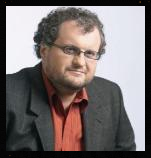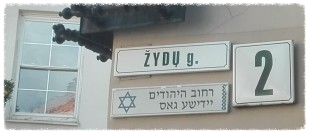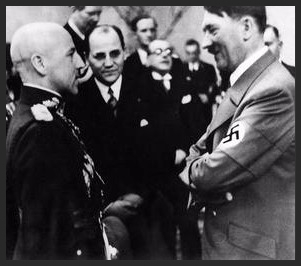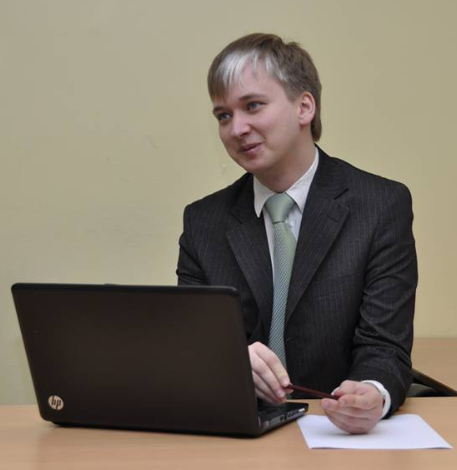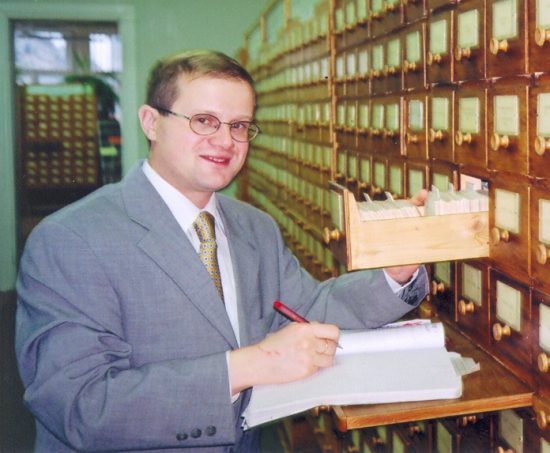-
VILNIUS: FOLLOWING DEFENDING HISTORY’S YEARS LONG CAMPAIGN AGAINST PUBLIC HONORS FOR HOLOCAUST COLLABORATORS, HEAD OF JEWISH COMMUNITY FAINA KUKLIANSKY SENDS POWERFUL, COURAGEOUS LETTER TO VILNIUS MAYOR CALLING FOR REMOVAL OF A PUBLIC PLAQUE HONORING HOLOCAUST PERPETRATOR JONAS NOREIKA (NOREIKA INSCRIPTION ON CAPITAL’S CENTRAL BLVD NOT YET MENTIONED).
Politics of Memory
Did “Double Genocide” Just Get to the “O’Reilly Factor”?
MEDIA WATCH | OPINION | USA
by Dovid Katz
◊
NEW YORK—At least a few viewers of the Fox News Channel’s premier prime time program, “The O’Reilly Factor” were taken aback to hear Bill O’Reilly spurt out last night, in his best high-school teacher by-the-way factual tone, “Stalin was as bad as Hitler! Alright, it’s the same thing!” during a segment presented as uncontested truth. The guest inspiring the “truism” was Mr. Marion Smith, executive director of the Washington DC based “Victims of Communism Memorial Foundation” (sometimes known for short as VOC).
When “Putin” Becomes an Excuse for Hitler-Glorification
OPINION
by Dovid Katz
This article appeared today in Jewish Currents:
◊
A recent Washington Post editorial rightfully takes Russia and China to task for persecuting those who dare challenge the state’s distortions of history. In the case of Russia, there is mention of the disgraceful prosecution of a citizen for pointing out that the September 1939 dismemberment of Poland was a joint venture of Germany and the USSR codified by the infamous Molotov-Ribbentrop pact. But wait a minute.
READ MORE
September 23rd Events in the Vilnius Region
DEFENDING HISTORY WAS THERE
Annual Sept. 23 Official Commemoration Ceremony at the Ponár (Paneriai) Mass Murder Site Outside Vilnius, Lithuania
Historic Breakthrough as Lithuanian Jewish Community’s Faina Kukliansky Finally Calls for Removal of Street Names and Memorials for Holocaust Collaborators, Boldly Citing Juozas Krikštaponis, Jonas Noreika, and Kazys Škirpa; Sharp Contrast with Last Year’s Failed Event
Run-Up to Lithuania’s Sept. 23rd 2016 Holocaust Commemoration Day
Events in the Week of Lithuania’s Official September 23rd Holocaust Commemoration Day
Vilnius mayor — and nation’s president and prime minister — face a stark choice on whether to speak out with moral clarity on painful issues of city-center street names and plaques honoring Holocaust collaborators, and the desecration of the country’s oldest Jewish cemetery by a new congress center, prior to this year’s series of official gala Vilna Ghetto commemoration events, 20-28 September 2016
OUR TAKE ON THE NEW HEBREW-YIDDISH STREET SIGN IN THE OLD JEWISH QUARTER
Leonidas Donskis (1962—2016)
◊
The Defending History Community Mourns our Colleague
◊
LEONIDAS DONSKIS
13 August 1962 — 21 September 2016
HIS WORK IN DEFENDING HISTORY INCLUDES ESSAYS ON:
♦ Inflation of the word “genocide” and criminalization of debate
♦ The campaign against Holocaust survivors who joined the anti-Nazi Soviet partisans and its implications
♦ Response to proposals to “reevaluate” the Hitlerist LAF and Provisional Government collaborators of 1941
Yiddish Loses Last Global Position as Symbolic “First Jewish Language” in Vilnius
OPINION | COMMEMORATION OF DESTROYED COMMUNITIES | YIDDISH AFFAIRS | LITVAK AFFAIRS | IDENTITY-THEFT LITVAK INDUSTRY
by Dovid Katz
◊
VILNIUS—For close to three decades, Vilnius has been the only city in the world with municipally sponsored public plaques and signs that regularly include Yiddish. Symbologically for a small, weak, stateless, threatened and “threat-to-nobody” language in this part of the world, it was an equally important statement of respect for the language, literature and culture of the murdered Jewish people of the city that Yiddish sometimes came first, “on top,” and always so when it was a question between Yiddish and modern Israeli Hebrew.
Att. Mr. Mayor of Vilnius: Streets Named for Hitler’s Local Partners, and Plans for Congress Center on Top of Old Jewish Cemetery
Sept. 2016 Discourse over “Historic Soul” of Central Vilnius
Will Vilnius Mayor & Lithuania’s PM & President Issue Morally Clear Statements on Two Sites Visible from Grand Dukes’ Medieval Hill?
THERE ARE FIVE JEWISH FORMS OF THE FABLED CITY’S NAME: ווילנא, ווילנע, ווילנה, וילנה, ווילניוס
(1) Changing the name of a city center street that glorifies a Nazi collaborator who enthusiastically supported the removal of his country’s Jewish citizens?
Vanagaitė and Zuroff’s “Mūsiškiai”
[last update]
For the first time, a Lithuanian author teamed up with an Israeli Holocaust scholar in search for the truth about widespread local enthusiasm, seventy-five years ago, for mass murder of civilian neighbors, and today’s failures in coming to grips with that history, in a land of hundreds of Jedwabnes. A genuine historic advance in Lithuanian-Jewish relations is seen in the startling partnership of Rūta Vanagaitė and Dr. Efraim Zuroff in Vanagaitė’s Mūsiškiai: Kelionė su priešu (“Our People: Journey with an Enemy”), published in Vilnius in January 2016. See also the media tracking page on the Simon Wiesenthal Center’s Operation Last Chance website.
English Lithuanian German Polish Russian
The following listing of coverage by language (English, Lithuanian, Russian, Polish) is far from exhaustive. The humongous reaction needs to be studied in its own right.
Nov. 2017 Update: Renewed media conflagration launched by the author’s 26 October 2017 PR rollout of multiple initiatives, two of which were directly relevant to the legacy of Mūsiškiai.
12 Holocaust Massacre Sites in Vilnius Region; Taking a Closer Look at 2
CEMETERIES AND MASS GRAVES | COMMEMORATIONS | LITHUANIA
◊
by Julius Norwilla
◊
There are at least twelve Holocaust mass murder sites in the immediate Vilnius region that are marked by some kind of memorial. They are noted in the online Holocaust Atlas of Lithuania, founded by Milda Jakulytė. In Lithuania, there are over 227 such sites that are described in the atlas, which is historically a continuation of the painstaking 1990s work of the late Joseph Levinson, published in his The Book of Sorrow (Vilnius 1997) that documented close to 200 such sites.
The best known is the Paneriai Memorial as the largest mass grave in the country, known as Ponár in Yiddish and Ponary in Polish. It is the site where 100,000 people were humiliated and murdered, around 70,000 of them Jews. This is where official commemorations take place, particularly each year on September 23rd, the day (controversially) designated by the Lithuanian government as the Holocaust Remembrance Day, rather than the international day, on January 27th, or days specific to the Lithuania-wide Holocaust such as June 23rd when violence against and humiliation of Jewish neighbors broke out across Lithuania.
Other mass murder sites in the Vilnius region are visited much less frequently and very often — not at all. But visiting these places is important for the respect for those murdered there and for a deeper understanding of the Holocaust which has so distorted our nation’s qualities.
My Take On Malát
OPINION | SHTETL COMMEMORATIONS | EVENTS | POLITICS OF MEMORY | COLLABORATOR GLORIFICATION
◊
by Julius Norwilla
◊
The year 2016 marks the 75th anniversary of the genocide of the Jews of the Lithuanian shtetls, the smaller towns, villages and countryside, in fact, a solid majority of Lithuanian Jewry (with a smaller component being kept alive in four cities for slave labor and rolling annihilation over the remaining years of the Holocaust). Marking the anniversary, at the end of August and beginning of September this year (a period in 1941 when a number of the local massacres were concentrated), there have been commemorative events in (Yiddish names first) Birzh (now: Biržai), Dusát (Dusetos), Malát (Molėtai), Shádov (Šeduva), Vílkomir (Ukmergė) and more. By far the largest event took place at Malát on the 29th of August. The project, leading to establishment of a new foundation, was initiated by Tzvi Kritzer. The speakers included high representatives from the Lithuanian government, its official Jewish community, and various public and cultural representatives.
Grigory Tzvi Kritzer’s Speech on the 75th Anniversary of the Malát Massacre
Grigory Tzvi Kritzer, a native of Vilnius, Lithuania, who settled many years ago in Israel, is a well-known Israeli soccer (football) agent. He was the primary organizer of the series of events that culminated in a march by thousands, unveiling of a multilingual monument, and launch of an exhibition, book, and film, in the small town (former shtetl) Malát (Molėtai, northeastern Lithuania) on 29 August 2016. The book and exhibition were the products of the initiative and creative work of regional museum director, Viktorija Kazlienė, in close cooperation with Leon Kaplan who edited and translated the book.
The day marked the 75th anniversary of the 1941 massacre of the town’s 2,000 Jews, then a majority of its population. This year’s day of memorial events there has drawn wide and varied media comment and coverage.
The following is the English text of Tzvi Kritzer’s speech, provided by his office at the request of Defending History. The translation is by Aleksandras Federas.
◊
We decided to walk that road one and a half years ago, and then I imagined that there would be only a few people here… Now, look around, my heart is beating with joy that our relatives and loved ones, who perished here in Molėtai, have not been forgotten.
Thanks to all of you, to those who have come from faraway countries and to those who live here, in Lithuania. I am particularly moved to see here people from all corners of Lithuania. I would like to thank the mayor of Molėtai, Mr. Stasys Žvinis, and all his team for their help and support.
Will the EU, the OSCE and the Council of Europe Ask Latvia to Revoke the 1998 Declaration?
OPINION | POLITICS OF MEMORY | GLORIFYING COLLABORATORS | LATVIA | ANNUAL WAFFEN SS MARCHES IN RIGA
◊
by Aleksandr Kuzmin (Riga)
◊
On 29 October 1998, a few weeks after the parliamentary elections, the outgoing Parliament of Latvia had adopted the Declaration on Latvian Legionnaires in the World War II. The vote was as follows: 50 ayes, 8 nays, 3 abstentions.
The text contains several questionable statements. Those include claiming that “The aim of soldiers who were drafted into the Legion or who joined it voluntary was to protect Latvia from the restoration of Stalin’s regime” and asking the government to “prevent insults against the honour and dignity of Latvian soldiers.” To make it clear — the ones whose reputation was intended to be defended were Nazi collaborators, voluntarily or not. And the intention was pretty obvious — as the rapporteur MP, Mr. Mauliņš, said before the vote, “this decision will be our position towards our soldiers who truly fought for the independence of Latvia”.
August and September 2016 Memorials for Destroyed Jewish Communities
Summer and Fall 2016: 75th Anniversary
of the Nazis’ annihilation, with vast local collaboration, of Lithuania’s Jews in the towns, villages, provinces; implementation of ghettoization and mass murder in the cities.
Perhaps among the simplest, most minimalist measures of a municipality’s sincerity (beyond PR bonanzas, photo-ops and legitimizations via useful foreigners): (a) Modest town-center information board on the origins, history, culture, contributions and (true) fate of the town’s Jewish citizens; (b) Rapid removal of any local shrines, street names, museum tributes etc. to the local collaborators and murderers. “You just can’t make heroes out of the killers and expect to cover it up with some annual PR event for the foreigners.”
Language and respect for the victims: In addition to Lithuanian and English, will new memorial texts (including those at forest mass graves and old cemeteries) continue to include Yiddish, the language of 100% of the murdered Jews in all these towns? For many years, Lithuania has had a uniquely admirable record in this regard.
Some High Latvian Politicians Think the Waffen SS Fought for Freedom
OPINION | POLITICS OF MEMORY | GLORIFYING COLLABORATORS | LATVIA | ANNUAL WAFFEN SS MARCHES IN RIGA
◊
by Aleksandrs Feigmanis (Riga)
◊
There are here in Latvia some high-ranking Latvian politicians who actually believe that the country’s Waffen SS fighters fought for freedom of their country. Every year on the 16th of March Latvian nationalists gather at the Freedom Monument in the heart of Riga, the nation’s capital, and in the cemetery at Lestene, a village some seventy-two kilometers from Riga, to remember and honor (honor!) the living and dead veterans of the Latvian Legion of the Waffen SS.
Established by order of Adolf Hitler on the 10th of February 1943, they fought for Nazi Germany against the Red Army on the Volkhov front near Leningrad, and later in Great River region, Kurzeme (Kurland), in Poland, Germany and elsewhere.
Although the alarming series of annual events commemorating and glorifying the Latvian SS Volunteer Legion events are now officially non-governmental, some MPs and even ministers do not hesitate to not only participate publicly, setting an example for the nation’s youth, but also to publicly refer to Waffen SS legionnaires as heroes and national freedom fighters. Had Hitler won the war, there would have been no Latvia left to become free in 1991. By swearing and oath to Adolf Hitler’s genocidal regime, and then in fact delaying the liberation of the concentration camps by the Allies, they were pawns of the Nazis who do not deserve to be glorified by a modern, democratic member of the European Union and NATO.
2016 Deterioration of Holocaust History and of Freedom of Speech in Poland
[UPDATED]
2 Sept 2016: Forward Exposes Rapid Deterioration of Free Speech and Academic Research on the Holocaust in Poland
1 August 2016: Dozens of Scholars of Polish Jewish History Publish a Bold and Historic Open Letter on Polish Government’s Distortions of History on Jedwabne and Kielce
Suspense rising on ultimate decision of master Brandeis scholar Antony Polonsky, who some think may have been manipulated by Lithuanian state honors in that country’s Holocaust politics
Baltic Red-Brown “Nazi-Soviet Hunter” Featured at Brazil’s Olympics in Rio
OPINION | RED-BROWN COMMISSION (PAGE) | RB COMMISSION (SECTION) | DOUBLE GENOCIDE | VILNIUS YIDDISH INSTITUTE
◊
VILNIUS—The news portal Delfi.lt reported yesterday on Lithuanian sharpshooting star Ronaldas Račinskas making a hit at the Rio de Janeiro Olympics not only for his talents with a rifle, but on his work back home for which the headline calls him the “Nazi-Soviet hunter,” in the latest of a long series of Holocaust terms appropriated and ably recast by the Red-Brown movement’s PR wizzards. Besides heading a commission that now includes the gentleman who launched the campaign, a decade ago, to “hunt” Holocaust survivors who joined the Jewish partisans, his “Nazi and Soviet hunting” refers to his role as Director of the Secretariat of that comission, popularly known as the Red-Brown Commission, a state-financed entity that is one of the main European engines for spreading the revisionist far right’s “Double Genocide” model of World War II history. In that history, as an example, those who liberated Auschwitz are declared to be equal in principle to those who committed the genocide there. Moreover the movement’s primary document, the 2008 Prague Declaration (PD), insists that all European “minds” accept the revised history and regard Nazi and Soviet crimes as equal, a stance widely considered to be a camouflage for obfuscating and diminishing the Holocaust. The response in the European arena came in the form of the 2012 Seventy Years Declaration (SYD).
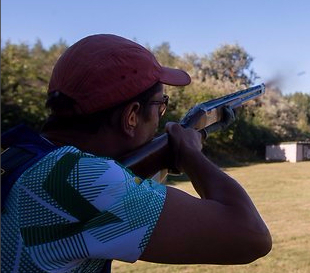
Director of the Secretariat of the state-sponsored International Commission on the Evaluation of the Crimes of the Nazi and Soviet Occupational Regimes in Lithuania (known for short as the “Red-Brown Commission”) is a sharpshooting star at the Rio Olympics. He has rapidly brought red-brown politics into the apolitical environment of the Olympic Games. His views on the Holocaust feature in a new German documentary.
Lithuanian State Bank and Major UK Firm Seem Deeply Involved in Vilnius Jewish Cemetery Scandal
PAPER TRAIL | REGISTRY OF OPPOSITION TO CONVENTION CENTER | DH SECTION
◊
VILNIUS—Turto Bankas, the state bank here whose main mission is to “organize and coordinate renewal of state-owned real estate,” has again revealed itself to be deeply involved in the international scandal of constructing a new National Congress Center in the heart of the old Vilna Jewish cemetery, whose graves date back to the fifteenth century and include some of the leading European Jewish scholars of the last millennium. The project continues to attract opposition from various parts of the world, including major Lithuania-descended rabbis internationally and some members of Lithuania’s small Jewish community. Moreover, Protestant and Catholic authors have pointed out that this would not likely be the fate of an analogous medieval vintage Christian cemetery.

